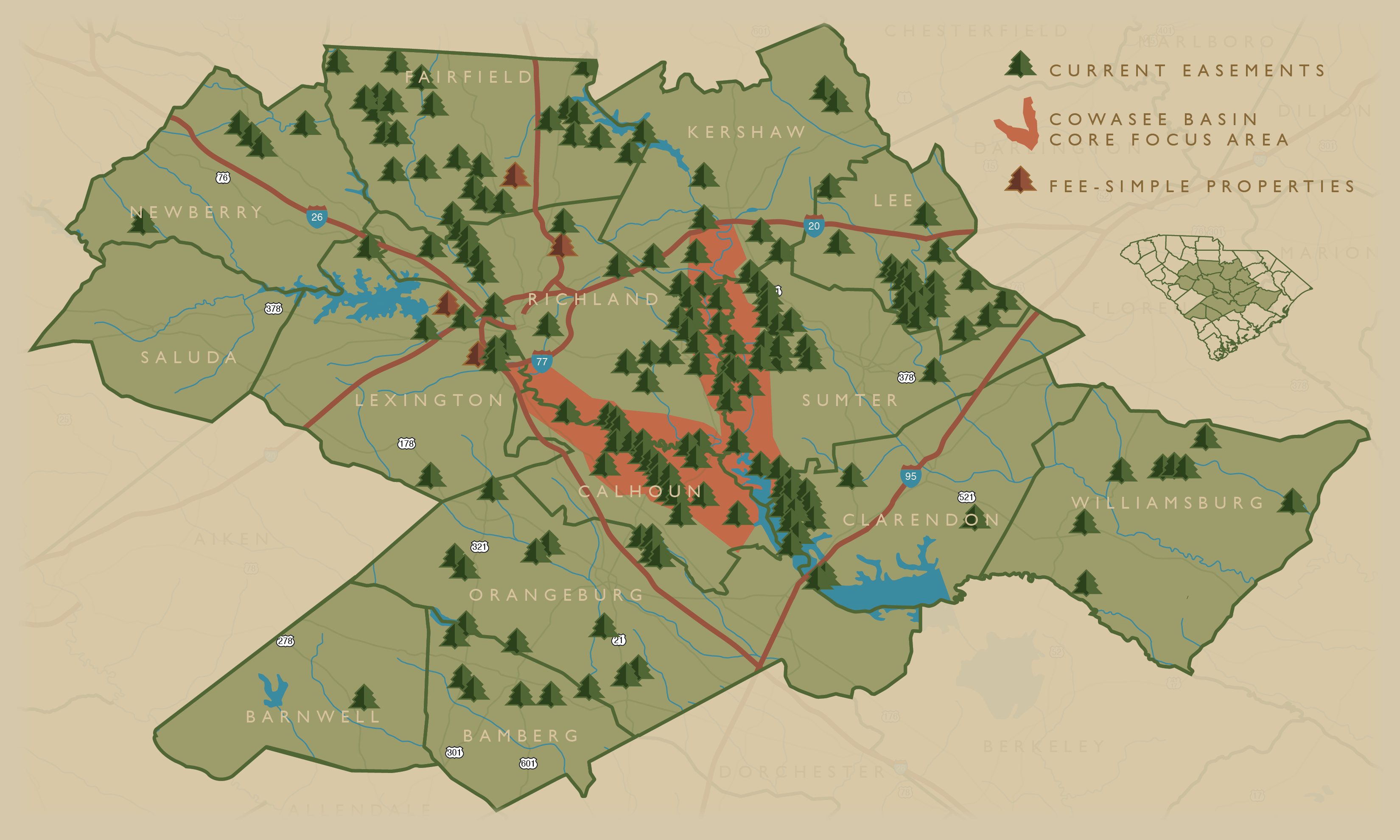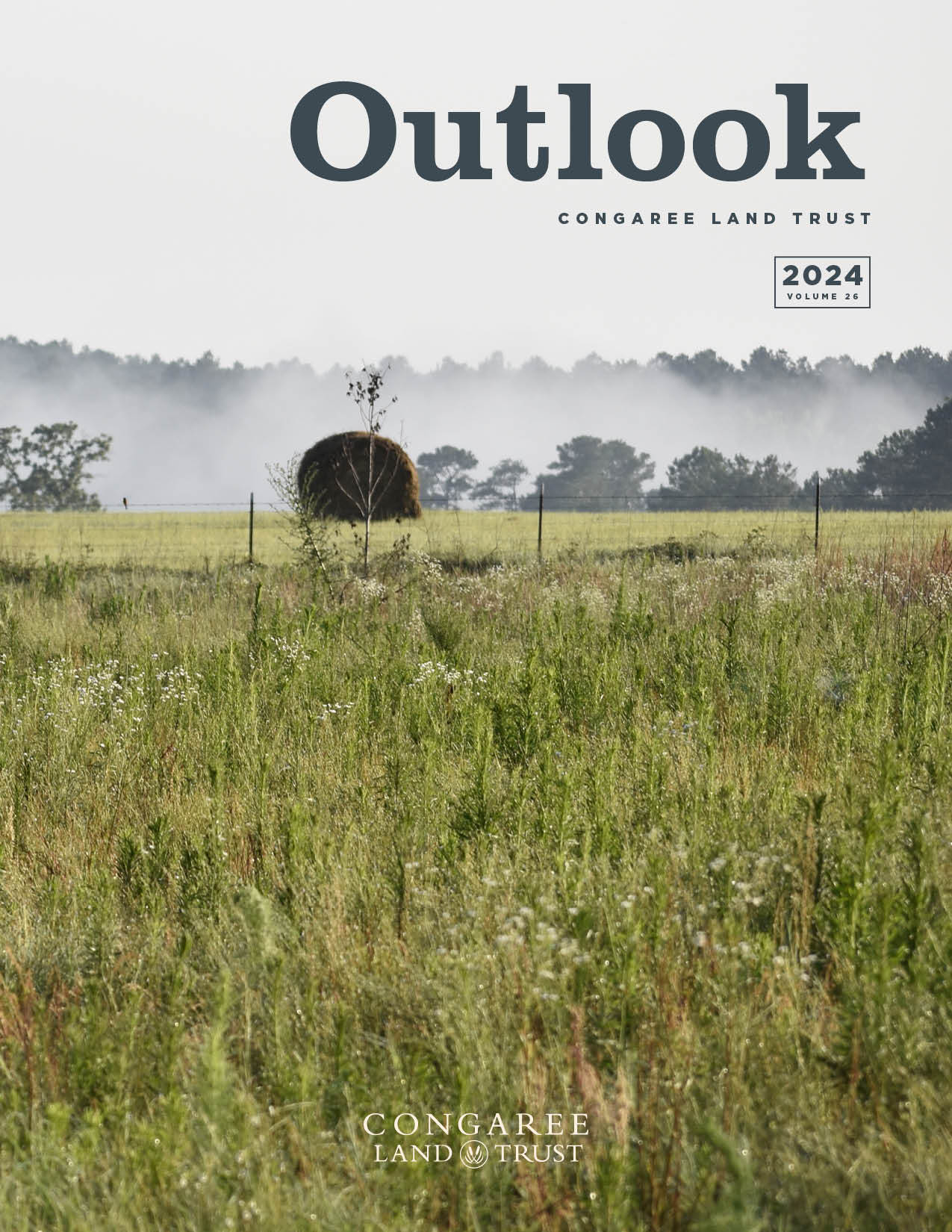Congaree Land Trust
The land is ours to protect. Our focus is on supporting economic vitality, promoting healthy lifestyles, safeguarding drinking water and protecting our quality of life.
The Congaree Land Trust (CLT) was founded in 1992 by seven individuals committed to conserving the natural and scenic lands, farms, waterways, forests, and open spaces that sustain us in central South Carolina. Our work spans 15 counties where the mountains have literally met the sea (Bamberg, Barnwell, Calhoun, Chester, Clarendon, Fairfield, Kershaw, Lee, Lexington, Newberry, Orangeburg, Richland, Saluda, Sumter, and Williamsburg).
Since our inception, we have conserved over 100,000 acres, representing over 220 individual properties of priority conservation land. In the heart of South Carolina, our focus is on supporting economic vitality, promoting healthy lifestyles, safeguarding drinking water and clean air quality, and protecting our local quality of life. Farming, forestry, outdoor recreation, and tourism, all tied to our natural resources, contribute approximately $54 billion to the state’s economy and provide over 463,000 jobs. Conservation easements help protect the natural areas that fuel our state’s natural resource-based economy and define our way of life.
The COWASEE Basin
The COWASEE Basin is the name given to a section of the COngaree and WAteree Rivers as they connect to form the SantEE. Spanning over 315,000 acres, this area boasts a significant measure of our focus. The nearly 27,000 acre Congaree National Park, at the center of the basin, is home to the largest old growth bottomland hardwood forest remaining in the eastern US.
A large number of our properties exist within The Basin, making it a focal point for our conservation efforts. However, the surrounding areas throughout central South Carolina hold equal value to the Land Trust in our efforts to preserve the region.

Conservation Easements
A conservation easement (CE) is a tool landowners can use to voluntarily protect their land. It is a legal agreement between a landowner and a private, nonprofit conservation organization, like the Congaree Land Trust (CLT), or a government agency, that permanently protects a property from development and subdivision. Some people consider a conservation easement the ultimate property right, as it allows the landowner to determine the future of the property and what it will look like for generations to come. Once a CE is recorded in the land records, all future owners are bound by its terms forever.
When you do a CE on a piece of property, you voluntarily and permanently give up some of the rights related to that property. For example, you typically give up the right to develop the property for commercial or industrial purposes. In some circumstances, you may be able to retain some limited rights to subdivide and/or build additional residential structures and related buildings on the property. You continue to own and live on the land and manage it as before the CE whether it be for farming, forestry, hunting, fishing, or general outdoor recreation. Even with a CE, you are still able to sell the property or leave it to your heirs.
When you create a CE on your land, the CE holder, such as CLT, accepts the responsibility to monitor the easement and to enforce its terms forever. We will visit the land annually, and we must be prepared to defend the terms of the CE agreement in court.
contact us to learn moreStaff

EXECUTIVE DIRECTOR

CONSERVATION DIRECTOR

LAND STEWARDSHIP MANAGER

LAND CONSERVATION SPECIALIST

OUTREACH & EVENTS MANAGER

COMMUNICATIONS MANAGER

LAND CONSERVATION INTERN
Board
PRESIDENT
Sojourner Caughman & Thomas, LLCMr. Trey Boone
VICE PRESIDENT
eSources LLCMs. Beth Bauknight
TREASURER
Bauknight Pietras & Stormer, P.A.Mr. Matt Riddle
SECRETARY
AgSouthMr. Trip Chavis
IMMEDIATE PAST PRESIDENT
Milliken Advisors, CEO
Mrs. Sharon Bryant
First Citizens Bank
Mr. Heath Carll
BlueCross BlueShield of South Carolina
Mr. Charles Carson
Mid-Carolina Marine, LLC & Southeastern Concrete Products
Mr. Charles H. Cate, Jr.
Retired
Mr. Robert G. Davidson Jr.
The Davidson-McNair Group at Morgan Stanley
Mrs. Iris Griffin
Dominion Energy
Mr. Everette Livingston
First Citizens Bank
Mr. Ryan McCue
Colliers
Mr. Jimmy Stevenson
The Southern Way
Mr. Hunter Suggs
National Land Realty
Mr. Josh Waters
Jim Hudson Automotive Group


